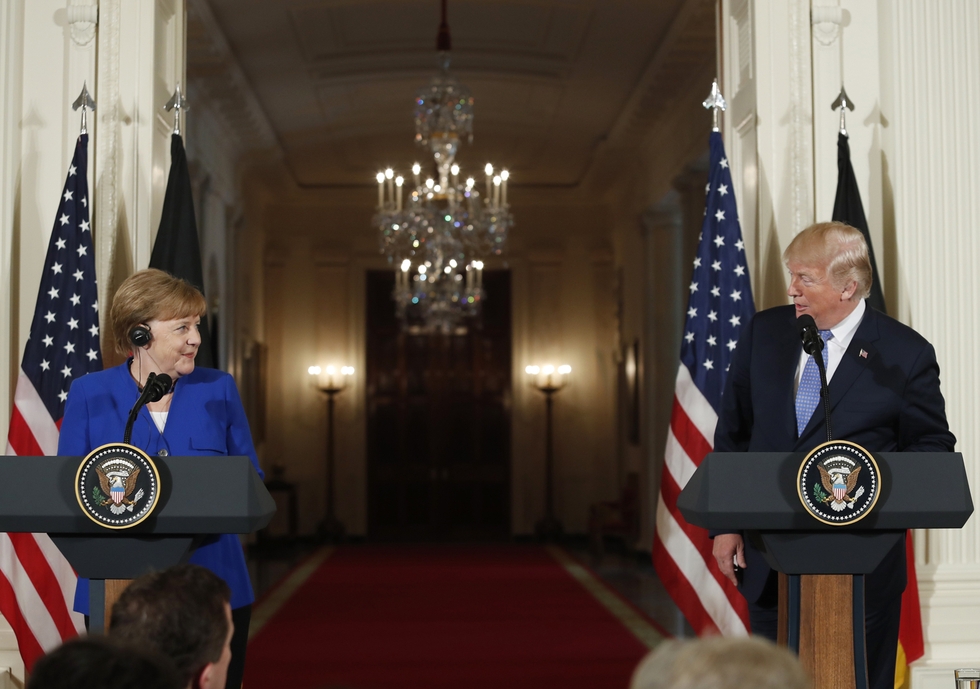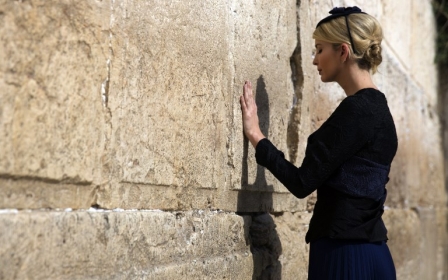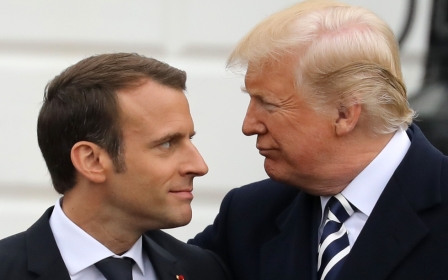Merkel meets Trump at White House to discuss differences over Iran deal

German Chancellor Angela Merkel, standing alongside President Donald Trump at the White House, said on Friday that the existing international nuclear deal with Iran is not enough to curb the Islamic republic's regional ambitions.
The so-called Joint Comprehensive Plan of Action, signed by Tehran and six world powers including Germany and the United States, is "a first step that has contributed to slowing down their activities in this particular respect," Merkel told reporters.
"But we also think from a German perspective that this is not sufficient in order to see to it that Iran's ambitions are curbed and contained.
"Europe and the United States ought to be in lock step on this," she said.
Merkel and Trump aired differences over trade, NATO and the Iran deal on Friday at a White House meeting where they tried to put on a show of warmth and friendship despite tensions between the two allies.
"We had an exchange of views. The decision lies with the president," Merkel told a joint press conference after Trump complained about the US-European trade imbalance, particularly in regards to automobiles.
Merkel's quick trip came the same week as a three-day state visit by French President Emmanuel Macron, who, like the German leader, pressed Trump on trade and urged him to keep the United States in the deal with Iran. Neither leader appeared to have made significant progress convincing Trump on either issue.
Trump also said on Friday he may travel to Israel next month to open the new US embassy in Jerusalem after ordering the move, in the face of widespread Palestinian anger.
The Trump administration's announcement in February that it would move the US embassy from Tel Aviv deepened anger across the Arab world, particularly among Palestinians who see East Jerusalem as the capital of their future state.
Trump had already broken with decades of US policy in December to announce Washington's recognition of Jerusalem as Israel's capital, drawing near-global condemnation and sparking unrest in the Palestinian territories.
Trump said he had almost signed off on a proposal to build a new $1bn embassy, but baulked when he considered the cost.
We will take a piece of the building. It is going to be beautiful. And it will be somewhat temporary but it could be for many years
- Donald Trump, US President
"The papers were put before me to sign an application for more than $1billion to build an embassy," said Trump.
The president said he then called the US ambassador in Israel, David Friedman, who said the cost of updating the consulate would only be $150,000.
"I said, 'David, let's not go from $1 billion to $150,000. Let's go to $300,000, $400,000.' That's what we did. We will take a piece of the building. It is going to be beautiful. And it will be somewhat temporary but it could be for many years," he said at a joint news conference with Merkel.
While Israel regards Jerusalem as its "undisputed and undivided" capital, much of the international community says its status should only form part of a final peace agreement and the embassy move will wreck a two-state solution to the decades-old conflict.
Palestinians particularly object to the decision to open the embassy to coincide with the 70th anniversary of Israel's creation in 1948 - the nakba, or "catastrophe," that led to the exile of hundreds of thousands of Palestinians.
While previous US presidents had run for election promising to move the embassy to Jerusalem, none ever pursued the relocation once in office.
Trump's critics have warned that the embassy move will undermine Washington's ability to act as a mediator between the Israelis and Palestinians in negotiating any final peace agreement, but the US president has brushed the criticism aside.
"The embassy in Jerusalem has been promised for many, many years by presidents," Trump said.
"They all made campaign promises and they never had the courage to carry it out. I carried it out."
New MEE newsletter: Jerusalem Dispatch
Sign up to get the latest insights and analysis on Israel-Palestine, alongside Turkey Unpacked and other MEE newsletters
Middle East Eye delivers independent and unrivalled coverage and analysis of the Middle East, North Africa and beyond. To learn more about republishing this content and the associated fees, please fill out this form. More about MEE can be found here.




